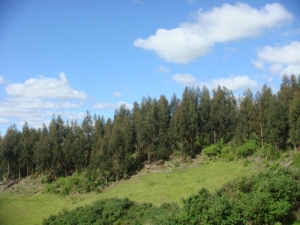New Zealand native tree study strengthens Bioeconomy Science Institute’s forestry leadership
A New Zealand-first native tree study has highlighted the Bioeconomy Science Institute's position as a forestry research leader.
 Forest operations will continue in Nelson and Marlborough forests during summer, except when the fire risk is at its highest.
Forest operations will continue in Nelson and Marlborough forests during summer, except when the fire risk is at its highest.
Forest operations will continue in Nelson and Marlborough forests during summer, except when the fire risk is at its highest.
Andrew Karalus, estate manager for Nelson Management Ltd, says providing continuous work is important for those working in the industry and it enables the industry to attract and retain highly skilled people.
"It's a trade-off to some extent. The risk of fire can never be totally eliminated, but there are probably 1500 people working in forests in the region who rely on year-round work for their livelihoods. Then there are the servicing firms, the trucking companies and wood processors – there are a lot of locals who rely on a steady wood flow for their income."
Karalus says the weather conditions that led to the recent Parsons Rd, Wairau Valley fire were not unusual. The fire risk at the time was code blue – midway on the five step code – so the outbreak and its severity came as a surprise.
"For 15 years we have been successfully operating without any major fires under conditions where the fire risk has been much more severe than we have had so far this summer. We will learn more from the latest events and we are tapping into expert advice to find out what happened and to improve our controls."
He says the forest fire danger codes, which were developed as a collaboration between the forest industry and two Rural Fire Authorities have been under review for six months. The codes have been found to be quite sound. However more work needs to be done to respond to the conditions under which a fire is more likely to start and spread.
"Typically, in a drought such as we had last summer, we reach conditions of code red. We don't have anyone felling or working in the cut-over forest during the heat of the day. Smoking and fires are of course totally banned. After crews leave for the day, someone stays behind to check that the site is completely safe and nothing develops into a fire," Karalus says.
"More challenging is the highly changeable weather we are experiencing at present, where periods of high-risk come and go during the day. We need to be able to identify when this is happening and respond quickly to avoid fire starts."
Agriculture and Forestry Minister Todd McClay is encouraging farmers and growers to stay up to date with weather warnings and seek support should they need it.
The closure of SH2 Waioweka Gorge could result in significant delays and additional costs for freight customers around the Upper North Island, says Transporting New Zealand.
OPINION: The year has started positively for New Zealand dairy farmers and things are likely to get better.
Ministry for Primary Industries (MPI) Director General Ray Smith believes there is potential for an increase in dairy farming in New Zealand.
New Zealand's new Special Agricultural Trade Envoy, Horowhenua dairy farmer, company director and former Minister of Agriculture, Nathan Guy says the Free Trade Agreement (FTA) with India is a good deal for the country.
New figures show dairy farmers are not only holding on to their international workforce, but are also supporting those staff to step into higher-skilled roles on farm.